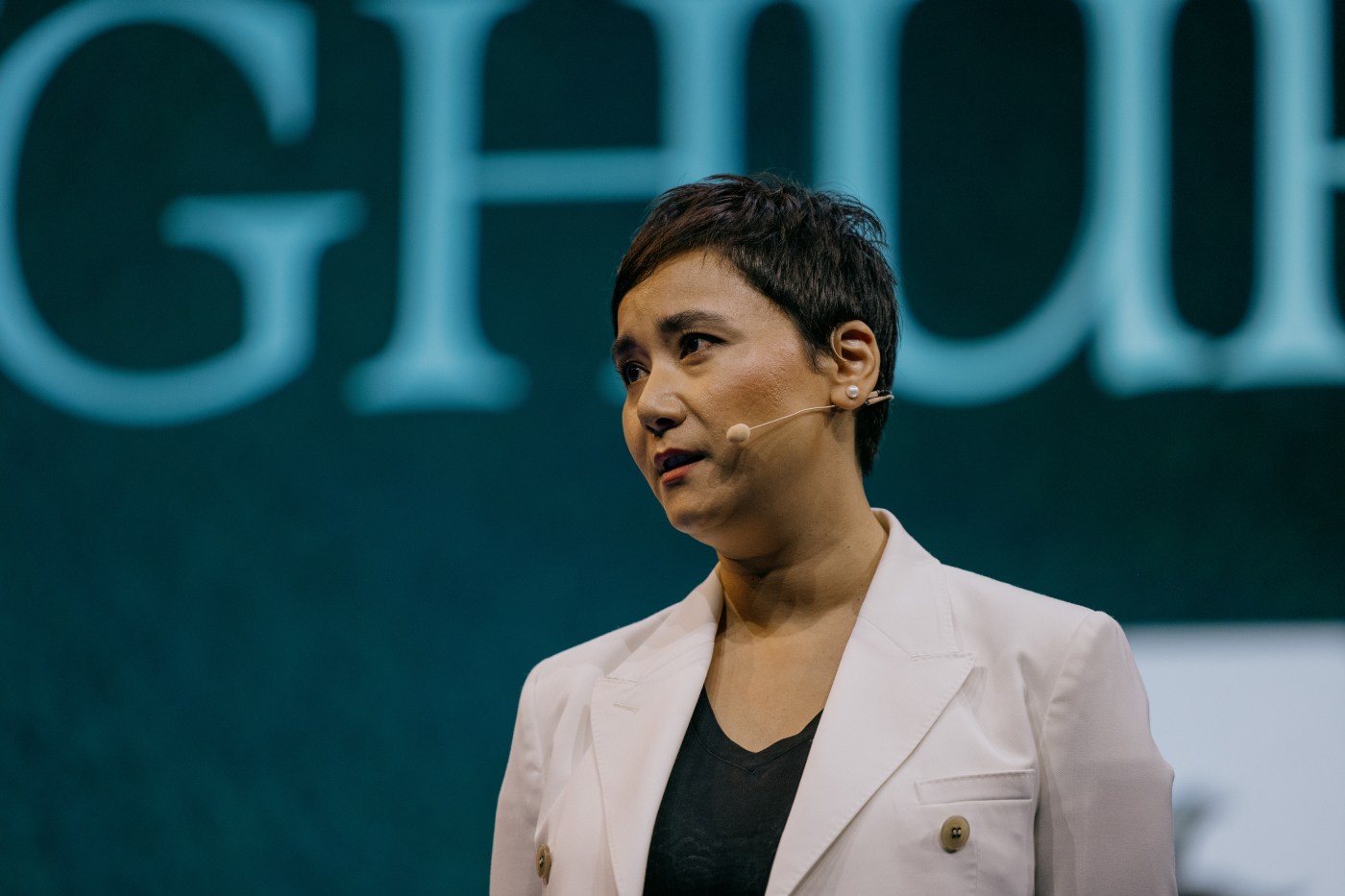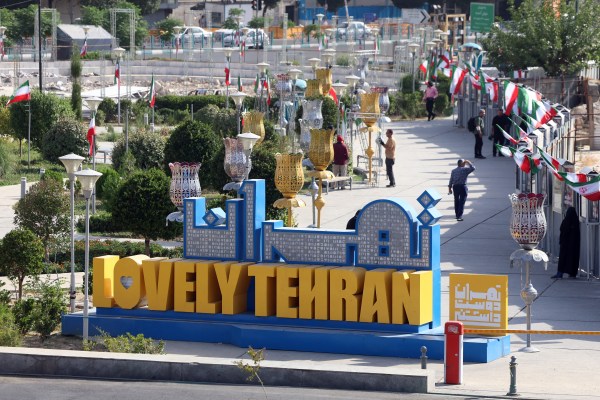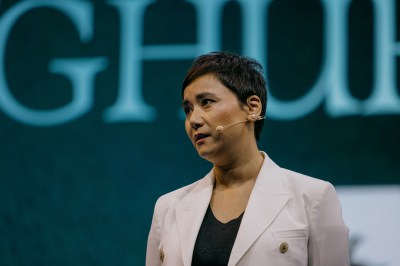It is knowledge bitterly won. Nyrola Elimä says that she understands the Holocaust better than ever. The world at large was indifferent. Some of the world was complicit. We are seeing indifference and complicity right now, she says.
Elimä is a researcher and journalist in Sweden, specializing in human rights and supply chains. I have met her in a neighboring country, Norway, at the Oslo Freedom Forum. She did not begin her life in Sweden—she is a Uyghur.
According to the U.S. State Department, among other bodies, the Chinese government’s persecution of the Uyghurs is genocide.
The Uyghurs are a Turkic people, located primarily in Xinjiang, or, as the Uyghurs themselves call that region, East Turkestan. Nyrola Elimä was born there in 1985. She grew up “sinicized,” she says. She went to Chinese schools, not Uyghur schools. Her first language is Mandarin.
“Did you feel Chinese or Uyghur?” I ask her. “That’s a really good question,” she answers. She was absorbed in Han Chinese culture and the system of the Chinese Communist Party. But this culture and this system never let you forget you were a Uyghur. You constantly had to praise them—the Han Chinese and the CCP—for tolerating you, for “nurturing” you. They were leading you out of your dark roots into a superior civilization.
As a young woman, out in the working world, Elimä lived in “mainland China,” by which she means, China beyond East Turkestan: glittering cities such as Beijing and Shanghai. But she was hampered by her identity. Right on her identity card, it said she was a Uyghur. That marked her as a second-class citizen, at best. She had a hard time registering at hotels. And her identity made life difficult for her landlords and employers.
Every week, they were summoned by the authorities to report on her—their Uyghur tenant or employee. Finally, it got to be too much. They told her, “If it were once a month, that would be one thing. But every week is too much. You will have to look elsewhere.”
Elimä made a determination that she had to leave China. This was not easy to do, as a passport was required, and Elimä did not have one. “We don’t give passports to Uyghurs,” the authorities told her, repeatedly. After two years, however, she managed to get one. She applied to Australia for a student visa but was rejected twice. She applied to Sweden for the same—and was accepted. She has been living in Sweden since 2011 and is a citizen of that country.
Her work is in English, mainly, and she speaks Swedish with friends and family. (She is married to a Swede.) How about Chinese? In Israel, there were German-born people who never wanted to speak their mother tongue again. They preferred to speak in broken Hebrew. Nyrola Elimä understands.
“Since 2017, the Chinese language has become burdensome to me,” she says. (It was in 2017 that Beijing’s persecution of the Uyghurs began with ferocity.) “I watch the Chinese news, of course, because I have to keep track of that. I talk with my Chinese friends in Sweden, because they’re not the ones who have harmed my family.” (We will get to that in due course.) “I sometimes miss Chinese food. I especially like Szechuan dishes, so spicy!”
When she speaks Mandarin, however, she feels a certain stress, almost a suffocation. She is reminded of the situation in her native land—of the genocide, in a word.
It took her some time to accept that this horror was taking place. The Chinese government, through its media, portrays Uyghurs as terrorists—terrorist enemies within. Every protester, every activist, every dissenter, is a “terrorist.” Elimä believed this. And she believed that these obstinate and overly “ethnic” Uyghurs were making trouble for “good” Uyghurs.
“What is wrong with these people?” she thought. “Why are they creating these problems? Thanks to them, I can’t register at a hotel, and if I do register, the police knock on my door at midnight. Why can’t these people think as I do? Why can’t they embrace Han Chinese education, obey the rules of the government, and praise the Chinese Communist Party?”
In 2018, however, someone close to her was arrested: arrested, imprisoned, and effectively disappeared. This was her cousin, Mayila Yakufu.
“She was like a moral model to me,” says Elimä. “If you knew her, you could not imagine her doing anything wrong.” Yakufu’s fate led Elimä to reexamine everything she had believed about the Chinese government and its relation to Uyghurs. Today, she says that she had simply been “brainwashed.”
China does not worry about judicial particulars. The authorities need no reason to arrest, imprison, and disappear a Uyghur: The fact that he or she is a Uyghur is enough. But the authorities concocted a charge against Yakufu: the “financing of terrorist activities.” In 2013, Yakufu had transferred money to her parents in Australia, so that they could buy a house.
Just to be clear, that was the “financing of terrorist activities”: a benign transfer of money.
I ask Elimä a blunt, awkward question: “Is Mayila still alive, do you know?” Elimä pauses and gulps a little. “Yes, she’s still alive. I don’t have confirmation or a direct contact, but, according to my parents, she’s alive and in prison.”
Elimä’s parents are under house arrest. They are charged with “possession of extremist items.” The items in question are photos of Yakufu, taken when the family traveled to Malaysia in 2015.
Over the years, I have interviewed many family members of political prisoners. They tend to tell the same story. At first, they were afraid to speak out or to make waves. They wanted to lie low, be good citizens. Work to solve the problem within the system. They did not want to make things worse for their imprisoned loved one. But there came a time when they realized: “Making quiet appeals has done no good. One must scream to the world.”
Nyrola Elimä had just this experience.
Before she spoke about her family to the Washington Post in 2019, she says, “I had a panic attack.” She had another such attack before she testified in front of the Uyghur Tribunal in London. (This was an unofficial body, collecting all the facts it could.) “I was so afraid,” she tells me. “The Chinese government was insanely monitoring everything. They launched smear campaigns against witnesses. And we all had family back in China.”
But then something happened that made Elimä go forward, boldly. She received word from her mother that Yakufu’s head had been shaved. Elimä pictured her cousin, without her beautiful hair. Bald, humiliated. “Then all my fear was just gone,” she says. “Love conquered the fear.” She went and testified about Yakufu, giving all the details she knew.
In her work, as a researcher and journalist, Elimä encounters a couple of major obstacles. First, people don’t want to hear about the Uyghurs. It is all too awful. Second, a lot of people have business ties to China. They are loath for human rights concerns to interfere with business.
Governments around the world have sent Uyghur asylum-seekers back to China, to suffer the worst. This is because China has dangled financial inducements before those governments. Elimä’s work on Thailand—its treatment of refugees and its relations with Beijing—has been damning.
A question for her: As far as she can tell, what do people in China think about the fate of the Uyghurs? The “elites” know, she says. People at the top know what is happening to the Uyghurs, and they generally approve. “Normal people,” she says, believe whatever the government tells them, and, in government propaganda, “Uyghur” is synonymous with “terrorist.”
When she lived in China, says Elimä, she had two friends—Han Chinese friends—who sympathized with the Uyghurs. She is reluctant to give details, lest they somehow be found out. But she relates one story. When the persecution of the Uyghurs accelerated, one of these friends reached out to her on WeChat, the Chinese social-media platform. This friend wrote just two sentences: “I dreamed about you last night, and when I woke up, I cried. Don’t come back.”
Giving me some final words, Elimä says, “We need people to believe the story we’re telling.” Also, “people need to pick a side”: either the Chinese government or its victims. You cannot engage in business as usual and do anything for the victims at the same time.
Elimä worries that “the bad guys are winning”—not just in China but everywhere. At some length, she speaks about Ukraine. “Why is the world allowing Putin to slaughter people, day after day? Do we really need to wait until Putin bombs Sweden or the United States? How can we just stand there when war crimes or genocide is being committed?”
On February 24, 2022, Vladimir Putin launched his full-scale invasion of Ukraine. “I will never forget that morning,” says Elimä. “The night before, I went to bed thinking, ‘What will happen to Ukraine tomorrow?’ I thought, ‘He’s going to flee.’” She meant Ukraine’s president, Volodymyr Zelensky.
When she got up, she looked at Twitter and saw “the Zelensky video,” as she says. On a street in Kyiv, surrounded by close advisers and cabinet members, the president said, “We are here, our soldiers are here, the citizens of our country are here.”
“I cried,” says Elimä. “He was about my age, and look at him! He has the entire nation on his shoulders. Sure, nobody’s perfect. His administration has problems. But this is wartime. He could have fled, as the Afghan president did. But he stayed.”
When she saw the video, says Elimä, “it really inspired me. It made me feel, ‘I am not alone.’ He doesn’t know me. He will never know me. But he inspired so many people, including me.”
Nyrola Elimä has inspired me herself. “You’re making good use of your time,” I tell her, “good use of your life.” “I hope so,” she says. We can know so.






Please note that we at The Dispatch hold ourselves, our work, and our commenters to a higher standard than other places on the internet. We welcome comments that foster genuine debate or discussion—including comments critical of us or our work—but responses that include ad hominem attacks on fellow Dispatch members or are intended to stoke fear and anger may be moderated.
With your membership, you only have the ability to comment on The Morning Dispatch articles. Consider upgrading to join the conversation everywhere.